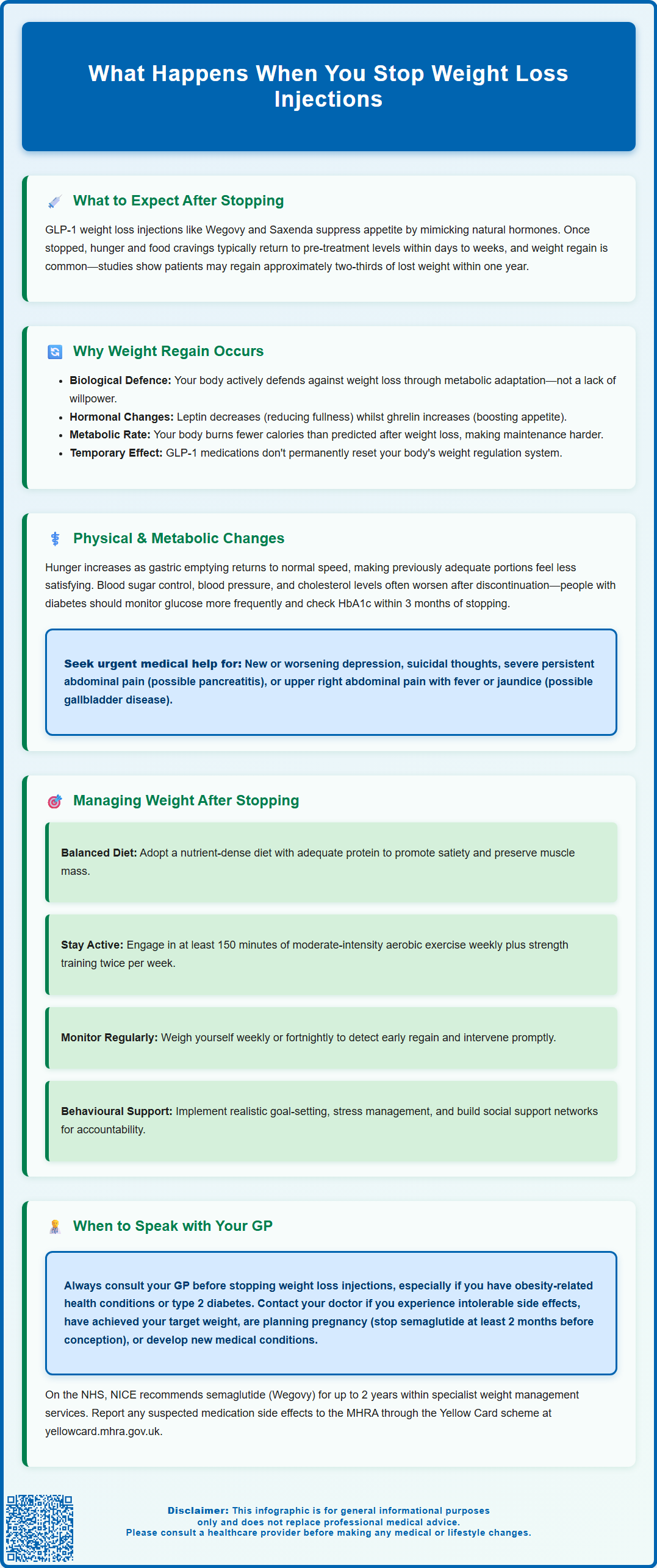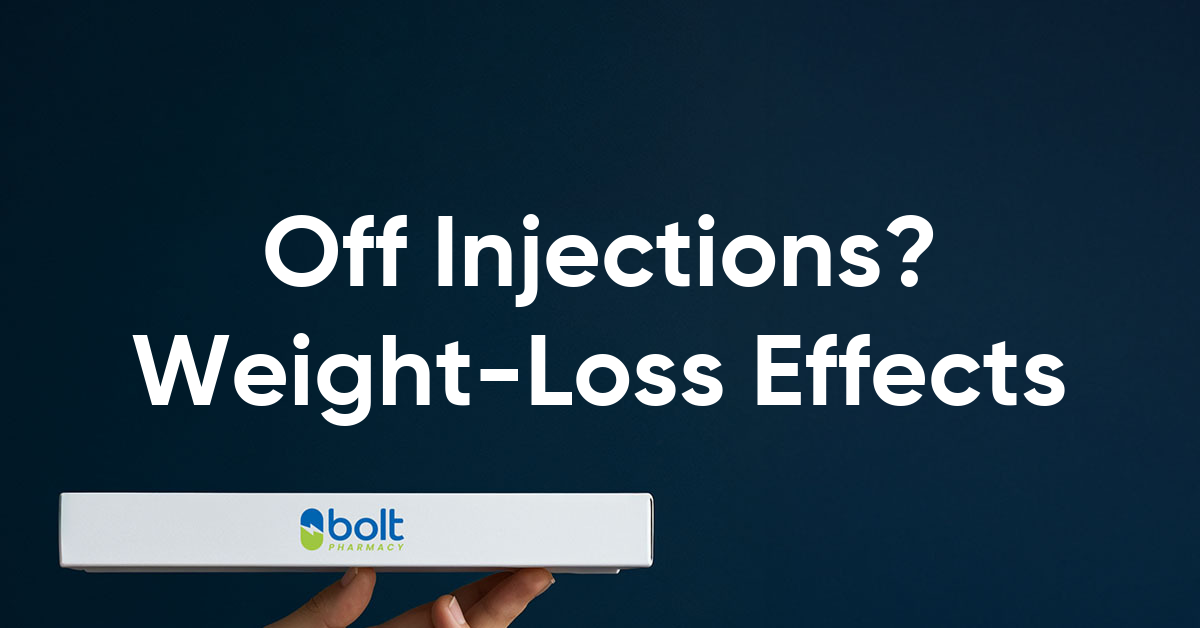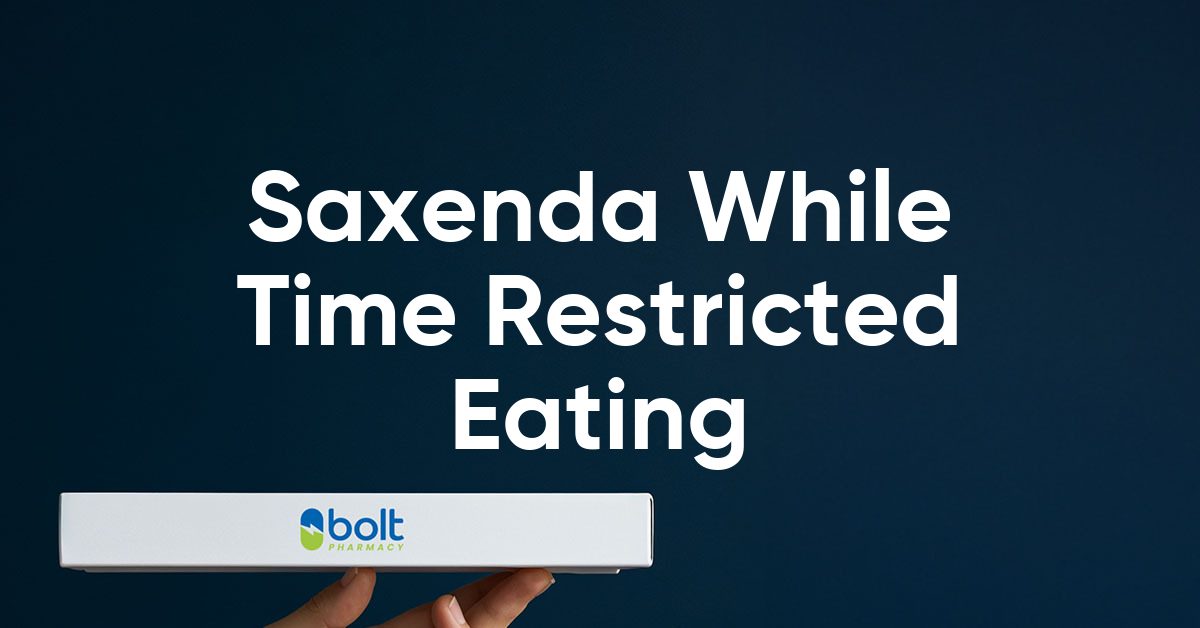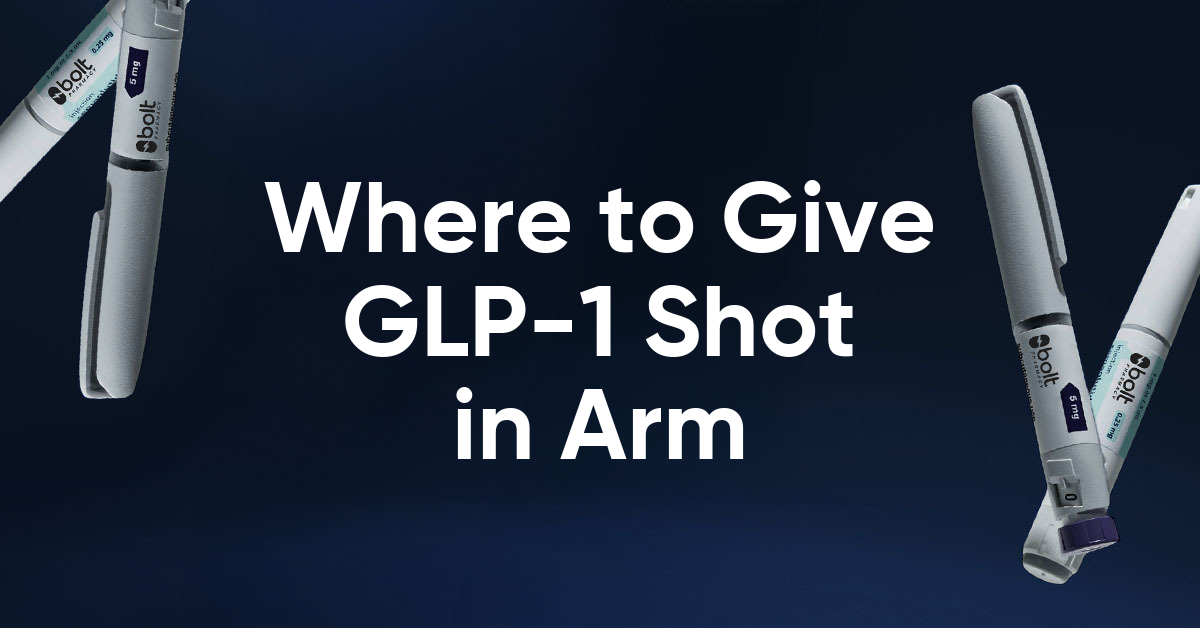When you stop weight loss injections such as semaglutide (Wegovy) or liraglutide (Saxenda), your body undergoes significant physiological changes as it readjusts to functioning without medication. Appetite typically returns to pre-treatment levels, and weight regain is common—clinical studies show patients may regain a substantial portion of lost weight within 12 months of discontinuation. These changes reflect complex biological mechanisms, including hormonal shifts and metabolic adaptation, rather than simply a lack of willpower. Understanding what happens after stopping treatment and implementing evidence-based maintenance strategies can help you manage your weight and health effectively. Always consult your GP before discontinuing any weight loss medication.
Summary: When you stop weight loss injections, appetite returns to pre-treatment levels and weight regain is common, with patients potentially regaining a substantial portion of lost weight within 12 months.
- GLP-1 receptor agonists such as semaglutide and liraglutide suppress appetite and slow gastric emptying; these effects diminish once the medication clears from your system.
- Weight regain occurs due to biological mechanisms including hormonal changes, reduced metabolic rate, and appetite dysregulation that the medication had been counteracting.
- Metabolic improvements achieved during treatment—including glycaemic control, blood pressure, and lipid profiles—often deteriorate after stopping.
- NICE recommends semaglutide (Wegovy) for up to 2 years within NHS specialist weight management services; always consult your GP before discontinuing treatment.
- Maintaining weight loss after stopping requires comprehensive lifestyle interventions including balanced diet, regular physical activity, behavioural strategies, and ongoing medical monitoring.
Table of Contents
What Happens When You Stop Weight Loss Injections
Weight loss injections, primarily glucagon-like peptide-1 (GLP-1) receptor agonists such as semaglutide (Wegovy) and liraglutide (Saxenda), have become increasingly prescribed for weight management in the UK. These medications work by mimicking natural hormones that regulate appetite and blood glucose levels. When you discontinue these injections, several physiological changes occur as your body readjusts to functioning without pharmaceutical support.
The most immediate change following cessation is the gradual return of appetite to pre-treatment levels. GLP-1 receptor agonists suppress hunger signals and slow gastric emptying, creating feelings of fullness. Once the medication clears from your system—which may take days for liraglutide (half-life ~13 hours) or several weeks for semaglutide (half-life ~1 week)—these effects diminish. Many patients report increased hunger, reduced satiety after meals, and a return of food cravings that had been suppressed during treatment.
Weight regain is common after stopping weight loss injections, with clinical studies indicating that patients may regain a significant portion of lost weight within 12 months of discontinuation. The STEP 1 extension trial demonstrated that participants who stopped semaglutide regained approximately two-thirds of their lost weight within one year. This occurs because the underlying biological factors that contributed to weight gain—including metabolic rate, hormonal regulation, and appetite control—have not been permanently altered by the medication.
It is important to understand that in the UK, NICE recommends semaglutide (Wegovy) for up to 2 years within specialist weight management services on the NHS. Private prescribing may follow different protocols. For patients with type 2 diabetes using GLP-1 receptor agonists, stopping treatment without medical supervision can lead to worsening blood glucose control. Always consult your healthcare team before discontinuing any weight loss medication.

Why Weight Regain Occurs After Stopping Treatment
Weight regain following discontinuation of GLP-1 receptor agonists is not simply a matter of willpower or dietary discipline—it reflects complex biological mechanisms that govern body weight regulation. The human body possesses sophisticated systems designed to defend against weight loss, often referred to as metabolic adaptation or adaptive thermogenesis. When you lose weight, your body may respond by reducing energy expenditure and increasing hunger signals to restore previous weight levels.
The biological drive to regain weight may involve multiple factors:
-
Hormonal changes: Weight loss may trigger alterations in hormones such as leptin (which decreases, potentially reducing satiety) and ghrelin (which increases, potentially stimulating appetite). These changes can persist after weight loss and may create a physiological environment that promotes weight regain.
-
Metabolic rate reduction: Your basal metabolic rate may decrease following weight loss, meaning your body requires fewer calories to maintain its new weight than would be predicted based on body composition alone. This metabolic adaptation can make maintaining weight loss challenging.
-
Appetite dysregulation: The hypothalamus, which regulates hunger and satiety, may become more responsive to food cues and less responsive to fullness signals after weight loss.
GLP-1 receptor agonists counteract these biological mechanisms whilst you are taking them, but they do not permanently reset your body's weight regulation systems. The STEP 4 trial showed that patients who continued semaglutide maintained their weight loss, while those switched to placebo regained weight—demonstrating the medication's ongoing role in weight management.
Additionally, psychological factors contribute to weight regain. Many patients experience reduced motivation to maintain strict dietary habits once medication is discontinued, particularly if they had relied heavily on the appetite-suppressing effects rather than developing sustainable eating patterns during treatment.
Physical and Metabolic Changes After Discontinuation
Beyond weight regain, stopping weight loss injections can trigger various physical and metabolic changes as your body readjusts. Understanding these changes can help you prepare for the transition and recognise what is normal versus what might require medical attention.
Gastrointestinal changes are among the first noticeable effects. During treatment, GLP-1 receptor agonists slow gastric emptying, which contributes to prolonged fullness. After discontinuation, gastric emptying returns to normal rates, which may initially feel like increased hunger or reduced meal satisfaction. Some patients report that portions that felt adequate during treatment no longer provide the same level of satiety. Gastrointestinal side effects experienced during treatment—such as nausea, constipation, or diarrhoea—typically improve after stopping but may take several weeks to fully resolve, particularly with semaglutide.
Metabolic parameters may also change following cessation. Clinical trials have demonstrated that improvements in glycaemic control, blood pressure, and lipid profiles achieved during treatment often deteriorate after stopping. For patients with type 2 diabetes or prediabetes, HbA1c levels may rise as the glucose-lowering effects of GLP-1 agonists diminish. More frequent blood glucose monitoring and an HbA1c check within approximately 3 months of stopping is advisable. Blood pressure may increase, particularly in individuals who experienced significant reductions during treatment.
Energy levels and mood can fluctuate during the adjustment period. Some patients report feeling more energetic initially as gastrointestinal side effects resolve, whilst others experience fatigue. The MHRA is reviewing reports of mood changes, including suicidal thoughts, in people taking GLP-1 receptor agonists. Contact your healthcare provider urgently if you experience new or worsening depression, suicidal thoughts, or unusual mood changes after stopping treatment.
Seek immediate medical attention if you develop:
-
Severe, persistent abdominal pain (which may radiate to your back), with or without vomiting—this could indicate pancreatitis
-
Pain in the upper right abdomen, fever, or yellowing of the skin/eyes—which may suggest gallbladder disease
Physical activity tolerance may change as well. Weight regain can reduce mobility and increase joint stress, particularly in individuals with obesity-related musculoskeletal conditions. Maintaining or increasing physical activity during and after treatment discontinuation is crucial for preserving metabolic health and functional capacity.
Managing Your Weight After Stopping Injections
Successfully maintaining weight loss after discontinuing weight loss injections requires a comprehensive, evidence-based approach that addresses both physiological and behavioural factors. Pharmacological treatment should always be combined with lifestyle interventions, and these interventions become even more critical after medication cessation.
Dietary strategies form the foundation of post-treatment weight maintenance. Focus on a balanced, nutrient-dense diet that emphasises whole foods, adequate protein intake (which promotes satiety and preserves lean muscle mass), and controlled portions. The NHS Eatwell Guide provides a practical framework for healthy eating patterns. Consider working with a registered dietitian who can help you develop sustainable eating habits tailored to your individual needs and preferences. Avoid overly restrictive diets, which are difficult to maintain long-term and may trigger binge eating or metabolic adaptation.
Regular physical activity is essential for weight maintenance and metabolic health. The UK Chief Medical Officers and NHS recommend at least 150 minutes of moderate-intensity aerobic activity per week, combined with strength training exercises on two or more days. Physical activity helps counteract the reduction in metabolic rate that may occur with weight loss and provides numerous health benefits beyond weight management. Find activities you enjoy to improve adherence—whether walking, swimming, cycling, or group fitness classes.
Behavioural strategies can support long-term success:
-
Self-monitoring: Regular weighing (weekly or fortnightly) allows early detection of weight regain, enabling prompt intervention before significant regain occurs.
-
Goal setting: Establish realistic, specific goals for eating and activity behaviours rather than focusing solely on weight.
-
Stress management: Develop healthy coping strategies for stress, as emotional eating often contributes to weight regain.
-
Social support: Engage family, friends, or support groups to maintain motivation and accountability.
Some patients may benefit from structured weight management programmes, such as those offered through NHS tiered weight management services (Tiers 2-4) or commercial providers. For those with significant weight regain, alternative medications such as orlistat may be considered, or referral to specialist services (Tier 3) or bariatric surgery assessment (Tier 4) according to NICE guidance. Your GP can provide referrals to appropriate local services.
When to Speak with Your GP About Stopping Treatment
Decisions about discontinuing weight loss injections should always involve consultation with your GP or prescribing clinician. Abruptly stopping treatment without medical guidance can have health implications, particularly for individuals with obesity-related comorbidities. Several scenarios warrant discussion with your healthcare provider about treatment cessation or continuation.
You should contact your GP if:
-
You are experiencing intolerable side effects that affect your quality of life or daily functioning
-
You have achieved your target weight and wish to discuss maintenance strategies
-
You are planning pregnancy (semaglutide should be discontinued at least 2 months before planned conception; GLP-1 receptor agonists are not recommended during pregnancy or breastfeeding)
-
You have developed new medical conditions or are taking new medications that may interact with your weight loss injection
-
You are experiencing unexpected or rapid weight regain after stopping treatment
-
You have concerns about the cost or accessibility of continued treatment
Your GP can help you weigh the benefits and risks of continuing versus stopping treatment based on your individual circumstances. For some patients, particularly those with significant obesity-related health conditions, treatment for the recommended duration may be appropriate. On the NHS, NICE recommends semaglutide (Wegovy) for up to 2 years within specialist weight management services.
If discontinuation is planned, your GP should arrange a structured approach including:
-
A comprehensive weight maintenance plan incorporating dietary, activity, and behavioural strategies
-
Regular follow-up appointments to monitor weight, blood pressure, and metabolic parameters (including HbA1c at approximately 3 months and lipids at 3-6 months)
-
Referral to specialist weight management services if additional support is needed
-
Discussion of alternative treatment options if weight regain becomes problematic
Do not stop your medication without medical advice, particularly if you have type 2 diabetes or other conditions being managed with the treatment. Your healthcare team can provide personalised guidance to optimise your long-term health outcomes.
If you experience any suspected side effects from your medication, report them to the MHRA through the Yellow Card scheme (yellowcard.mhra.gov.uk or the Yellow Card app).
Frequently Asked Questions
How quickly will I regain weight after stopping weight loss injections?
Weight regain varies individually, but clinical studies show patients may regain a substantial portion of lost weight within 12 months of stopping treatment. The STEP 1 extension trial found participants regained approximately two-thirds of their lost weight within one year after discontinuing semaglutide.
Will my appetite return to normal after stopping GLP-1 injections?
Yes, appetite typically returns to pre-treatment levels once the medication clears from your system—within days for liraglutide or several weeks for semaglutide. Many patients report increased hunger, reduced satiety after meals, and a return of food cravings that had been suppressed during treatment.
Should I consult my GP before stopping weight loss injections?
Yes, always consult your GP before discontinuing weight loss injections. Stopping without medical guidance can have health implications, particularly for individuals with type 2 diabetes or other obesity-related conditions, and your GP can help develop a structured weight maintenance plan.
The health-related content published on this site is based on credible scientific sources and is periodically reviewed to ensure accuracy and relevance. Although we aim to reflect the most current medical knowledge, the material is meant for general education and awareness only.
The information on this site is not a substitute for professional medical advice. For any health concerns, please speak with a qualified medical professional. By using this information, you acknowledge responsibility for any decisions made and understand we are not liable for any consequences that may result.
Heading 1
Heading 2
Heading 3
Heading 4
Heading 5
Heading 6
Lorem ipsum dolor sit amet, consectetur adipiscing elit, sed do eiusmod tempor incididunt ut labore et dolore magna aliqua. Ut enim ad minim veniam, quis nostrud exercitation ullamco laboris nisi ut aliquip ex ea commodo consequat. Duis aute irure dolor in reprehenderit in voluptate velit esse cillum dolore eu fugiat nulla pariatur.
Block quote
Ordered list
- Item 1
- Item 2
- Item 3
Unordered list
- Item A
- Item B
- Item C
Bold text
Emphasis
Superscript
Subscript












